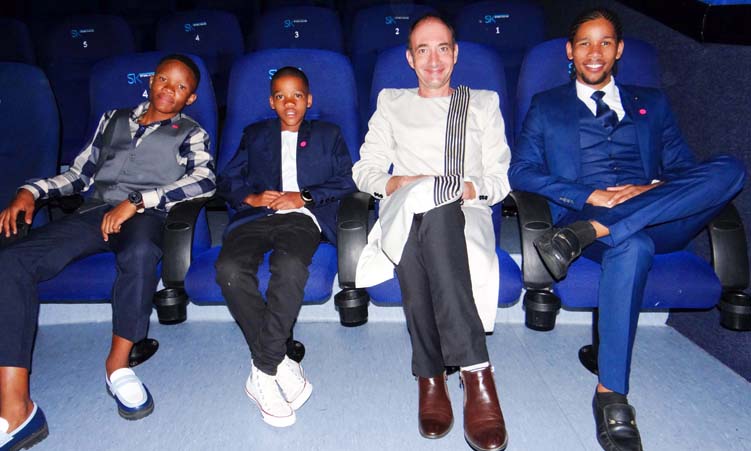As he speaks at the premiere of ‘Lukas’ (2024), a film concerned with the growing issue of Namibia’s street children, director Philippe Talavera makes a chilling observation.
Out of the 21 street children and young adults interviewed for the film, four have been witness to a gruesome murder.
Written by screenwriter Mikiros Garoes based on the grim reality of these first-person testimonies, ‘Lukas’ premiered to applause at Ster-Kinekor Grove Mall last Thursday as a tool to more deeply witness, humanise, understand and take action to safeguard the children we so often see with hands outstretched.
“Why street children, you may ask,” says Talavera, who has built a film career concerned with spotlighting pressing social issues such as HIV-AIDS, child marriage and lesbian, gay, bisexual, transgender, queer, intersex and other (LGBTQI+) rights in the films ‘Salute’, ‘Kukuri’ and ‘Kapana’, as well as through his work as director of the Ombetja Yehinga Organisation (OYO).
“I think all of us living in Windhoek can see more and more children on the streets, begging at robots, asking you for a dollar or two. Those children we see at the robots are the tip of the iceberg. There’s many more children living or working on the
streets, especially at Katutura,” he says.
“It’s becoming a human rights issue. The basic rights of the child to education, to health, to a safe roof over their head are not met. They get involved with drugs and alcohol at an early age. They often get in conflict with the law, but what do we really know about them? That’s why we wanted to tell their stories.”
In ‘Lukas’ we meet an amalgamation of the 21 Namibians who have told their stories of life on the streets of Windhoek.
Following the talented Lukas over 15 years, the audience is endeared to a young man whose comedic knack for impersonation seems to promise a bright future.
After a family tragedy rips his dreams asunder, Lukas, who is played by Alejandro Cooper, Hernandes Goanakgosi and Treazurique Titus, is neglected, rejected and ultimately flung into the street.
What awaits him is an existence one can only guess at as we debate whether to spare a dollar for a child begging at a traffic intersection.
Drugs, drug-dealing, sexual abuse, exploitation, gangsterism, theft and the fight for one’s very life are the order of every day, and this actuality is affectingly brought to life by Cooper, Goanakgosi and Titus who poignantly play the titular character as they make their big screen debuts.
While a more detailed review is forthcoming after the Afrikaans language film (with English subtitles) runs at Ster-Kinekor for a week from 8 March, it suffices to say that Talavera and Garoes have succeeded in creating a bittersweet picture that brings some of the most invisible, vulnerable and misunderstood members of society into focus in a manner that would make many rethink their interactions with this segment of humanity, as well as our responsibility to Namibian children.
Produced by OYO and supported by the embassy of Germany under its human rights portfolio, the film premiere drew a diverse crowd and included OYO patron and minister of justice Yvonne Dausab.
“At the commemoration of World Children’s Day in November 2022, his excellency Dr Hage Geingob said: ‘As leaders and caregivers, it is our responsibility to bring awareness to children about violence in the forms of abuse, rape, exploitation and discrimination, and to provide an environment in which children are cared for, loved and provided with basic services to grow to their full potential’,” Dausab said at the premiere.
Dausab also expressed the belief that film can be a catalyst for social change.
“Let us embrace the journey that this film will take us on tonight. I further hope that it will motivate you to act in your own way whether it is by donating, volunteering, advocating or educating so that the whole of society recognises that having children on the streets is an indictment on our collective conscience as a nation,” Dausab said.
“We cannot and must not rest until that situation changes.”
– martha@namibian.com.na ; Martha Mukaiwa on Twitter and Instagram; marthamukaiwa.com
Stay informed with The Namibian – your source for credible journalism. Get in-depth reporting and opinions for
only N$85 a month. Invest in journalism, invest in democracy –
Subscribe Now!






